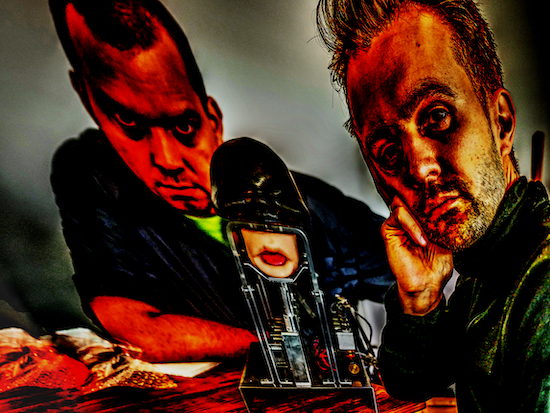Photo by VIlle Kallio
Amnesia Scanner describe themselves – straight-faced, apparently – as "EDM adjacent." The phrase is notable for the way it draws upon the peculiar vernacular of estate agents. As we learnt from the extract of Wayne Holloway’s novel Bindelstiff published on this website a little over twelve months ago, "the argot of Californian realty" will have it that "properties not in Beverly Hills but close by are designated Beverly Hills adjacent, spoken with as little pause between each word as possible."
The realtor’s sleight of tongue is suggestive of the smooth creep of gentrification. Think of those notorious London neo-toponyms ‘Blackheath Approach’ (or Lewisham, as everyone outside of the Foxtons payroll calls it), ‘Lower Chelsea’ (i.e. Battersea), and ‘Herne Hill Borders’ (Brixton).
What then is the geographical relationship between Amnesia Scanner and, say, Skrillex or Deadmau5 or whatever other Electric Daisy Carnival alumnus? I would suggest that Amnesia Scanner’s professed ‘adjacency’ is intended to work a subtly different form of magic to that which would seek to raise rents in Tower Hamlets with the abracadabra-like sigil, ‘SoSho’. It would associate and simultaneously keep apart, mark a certain distance. Amnesia Scanner want the drops, but they don’t want to get flecks of whipped cream and possible glacé cherry from someone else’s hurled cake on their nice clothes. It’s, you know, EDM – but not for those sort of people.
And sure, why not? Who wouldn’t want to disassociate oneself from all that vulgarity, those gurning bros with their athleisure wear and questionable sexual politics? One may sympathise and yet still recognise a certain resentment at work here of the other’s enjoyment. As much as, say, Skrillex makes essentially bad music, it is bad music that at least has the benefit of a certain liveliness, a sort of colourful playfulness. It doesn’t take itself too seriously. Amnesia Scanner appear to take themselves very seriously.
I had a certain sympathy for the duo when their first album came out in 2018. I saw them live in Shoreditch somewhere, supporting Holly Herndon. My wife literally fell asleep in the back of the club during their set, but I thought they were alright. There was one song I liked. But if I’m honest I think what I liked about them was that they basically sounded like Skrillex but were somehow less embarrassing to namedrop. I mean, fuck it, ‘Scary Monsters And Nice Sprites’ is kind of a tune in a rather crude, brash, dumb sort of way. That first Amnesia Scanner record, when it comes down to it, is no less dumb. But it is a lot less colourful and playful. It’s a kind of po-faced Skrillex. Skrillex for people who like to start their tweets with, ‘Actually…’
Clearly, though, this is a grift that works, ‘cos from what I can gather the cool kids are fucking falling over themselves for this group. For a certain kind of twenty-first-c music critic, Amnesia Scanner have come to represent the big-f-Future, living proof that all the old ‘nuum bloggers of a decade and a half ago were wrong and pop can indeed still innovate and surge forwards in a breathless rush, beckoning on the gleaming white heat of the high tech utopia. They are even tagged ‘accelerationist’ on LastFM. Which is odd, in a way, because their new album sounds uncannily like a Limp Bizkit B-sides collection.
Talk of accelerationist aesthetics, sonic fictions and musical futurism harks back to a set of discourses elaborated by a group of writers more or less associated with the Cybernetic Culture Research Unit at Warwick back in the ’90s (and, following that, the fervid blogosphere of the early and mid-’00s). Simon Reynolds wrote paeans to that "surging-into-the-future feel of periods like the psychedelic sixties, the post-punk seventies, the hip hop eighties and the rave nineties." Mark Fisher penned excoriating blogposts against "trad rock" and "arch-conservative tediocrats" as if any music that wasn’t looking ahead was somehow betraying its prime directive. Kodwo Eshun spoke of being "dragged into another sonar system" by "sonic spaceships," of recorded media as an interface between science and myth. These writers had their differences. They each had their own tastes. But one thing they agreed on was the utterly execrable nature of nu-metal.
The likes of Korn and Papa Roach always seemed to thrive on a particular kind of impotent acting-out, a carefully cultivated image of transgression pieced together in the most sterile laboratory conditions. Wacky haircuts and red-faced gurning. There was a lot of foot stomping. But at least, I guess, they could be bothered to try and look like they cared. Amnesia Scanner, on the other hand, despite drawing on essentially the same sonic palette – the highly processed nasal vocals, the doomy riffs played on over-chewed distortion-pedal guitars, heavily gated reverby drums, 8-bit hip hop samples, random bits of faux-gregorian chanting, shrieks and sirens and grunts and dive-bombing glissandi – seem to cultivate nothing so much as an image of extreme boredom. Whatever future it is they’re selling, they’re already so over it. Let’s say it’s a fixer-upper.


